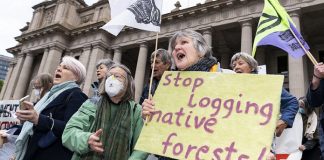On April 13, resource giant Woodside Petroleum announced that it was pulling out of a planned $45 billion gas processing plant development at James Price Point in the Kimberley, WA.
This is a major win for a campaign involving staunch opposition from Traditional Owners, residents and major environment groups.
Woodside has not given up on extracting the massive gas reserves held off the Kimberley coast. Resource industry analysts are tipping the company to return seeking approval for a floating LNG platform.
But the decision is a serious blow to Liberal Premier Colin Barnett’s vision for industrialising and ripping up the Kimberley. The gas plant at James Price Point was supposed to be followed by other major mining and processing projects.

Woodside says that falling gas prices, because of the explosion of shale gas projects in the US, have made the gas plant commercially unviable.
But without the protest movement the development might have gone ahead long ago. Hundreds of arrests over the last three years have forced costly delays. Senior Goolaraboloo Law man Phillip Roe has been at the centre of a blockade camp confronting Woodside’s attempts to establish infrastructure at James Price Point. “We are celebrating, we are overjoyed, we gave up so much of our time and fought a long battle,” he said.
The Greens won a 12 per cent swing across the Kimberley in the recent state election. In Broome itself, The Greens topped the polls with 36 per cent of the primary vote. On 2 March more than 10,000 people marched in Perth against the proposal.
Woodside has bitterly divided Aboriginal people in the Kimberley. A Native Title Agreement negotiated by the Kimberley Land Council was worth $1 billion over the life of the project.
Under Native Title laws Traditional Owners have no legal right to veto development—only to negotiate compensation. Premier Colin Barnett had also threatened to respond to any extended delays in negotiation with compulsory acquisition of James Price Point.
As usual, Aboriginal people have been divided and held over a barrel during negotiations because of the criminal government neglect that keeps them in poverty.
Warren Greatorex from the pro-Woodside Aboriginal company Waardi Ltd said the negotiation process has caused, “Lots of heart ache and pain… but there were a range of social benefits coming from this deal such as health, housing, education, elders and youth recreation activities… it’s disappointing this won’t come to fruition”.
But it is a disgrace that Aboriginal people should be held to ransom in this way. Basic services and housing should not be dependent on surrendering land and accepting environmental vandalism.
By Paddy Gibson





